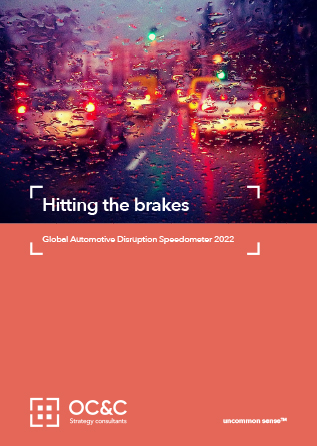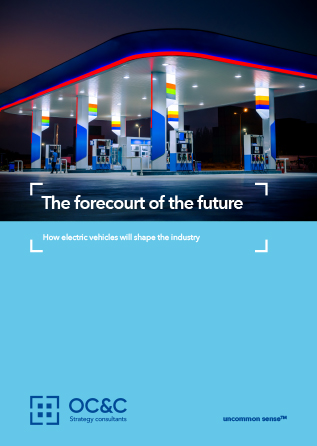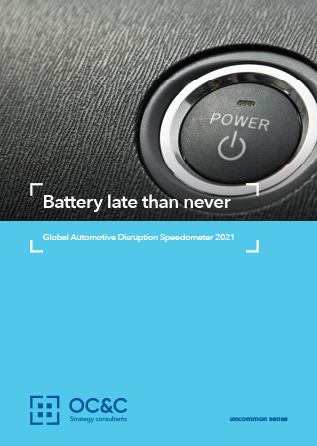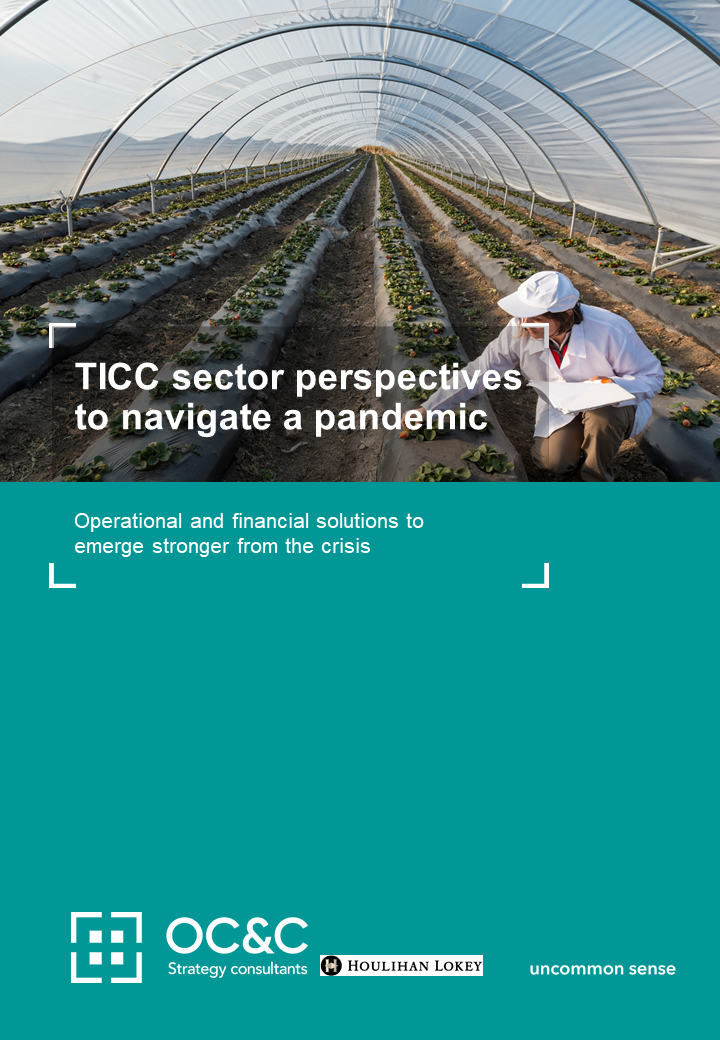Where to Rev Up
The automotive industry is undergoing seismic shifts, driven by technological advances, sustainability efforts, and fluctuating consumer preferences. But what truly shapes the future of the industry? The 2024 Automotive Disruption Speedometer outlines the evolving dynamics that both challenge and create opportunities for businesses in the sector.
This focus of this year’s report is the evolution of consumer behaviour, the factors that are holding back electric vehicle (EV) adoption, and how players can stay ahead in an industry where function increasingly trumps form.
Key Findings
1. Consumers want functional, not fun
The car, once a symbol of status, has become a functional necessity. People continue to value car ownership, but their motivations have shifted towards practical concerns like affordability and reliability – rather than prestige. Our research found that in regions like the US and Europe, the importance of cars as status symbols has significantly declined, especially among younger generations.
2. EV adoption is lagging – but barriers are in consumer perception, not reality
Despite the hype around electric vehicles, their adoption remains slower than anticipated. Consumers are hesitant due to concerns about cost, range, and charging infrastructure – though many of these challenges are more about perception than reality. Governments and automakers will need to ramp up educational efforts to bridge this gap, particularly in markets outside China, where enthusiasm for EVs remains strong.
3. Physical is the new digital
While online car shopping surged during the pandemic, it has since plateaued. The omnichannel experience, blending online convenience with physical dealerships, is now the model that resonates most with consumers. Traditional dealers that integrate digital tools into their sales and servicing processes are best positioned to win in this evolving marketplace.
4. Subscription models have stalled
The idea of subscription-based car ownership, where consumers pay a monthly fee covering everything from insurance to maintenance, hasn’t taken off as expected. While consumers are interested in the concept, particularly because of its stability and predictability, current offerings haven’t yet hit the sweet spot in terms of affordability and value.
5. The Chinese car parc: a glimpse of the future?
Chinese car owners, generally younger and wealthier than their Western counterparts, are much more open to purchasing cars online, driving electric vehicles, and exploring alternative ownership models like subscriptions. It remains to be seen if this trend is a reflection of the relative nascency of the Chinese market, or a roadmap for the Western car parc.
In a market driven by cost, consumer preferences, and regulatory pressures, successful businesses are those that can adapt quickly. Investments in data, consumer insights, and omnichannel strategies will be critical to staying competitive. The 2024 Speedometer report identifies where to rev up investments—whether it’s in digital retail, EV infrastructure, or flexible financing options—and where to reverse course.
For more detailed analysis, read the full 2024 Automotive Disruption Speedometer below.
For more on the auto industry, read our previous Speedometer report here – and find out more about our expertise in this space here.
Key Contacts

Jean-Baptiste Bertrand
Associate partner

Maurice Violani
Partner

Ye Chen
Partner

Felicity Latcham
Associate Partner

Steven Kwok
Partner

Bram Kuijpers
Partner

Alberto Regazzo
Partner

Mark Jannaway
Partner

Pascal Martin
Partner

Nicholas Farhi
Partner

Tom Kamps
Associate Partner

Dominik Krieg
Associate Partner
The automotive industry is undergoing seismic shifts, driven by technological advances, sustainability efforts, and fluctuating consumer preferences. But what truly shapes the future of the industry? The 2024 Automotive Disruption Speedometer outlines the evolving dynamics that both challenge and create opportunities for businesses in the sector.
This focus of this year’s report is the evolution of consumer behaviour, the factors that are holding back electric vehicle (EV) adoption, and how players can stay ahead in an industry where function increasingly trumps form.
Key Findings
1. Consumers want functional, not fun
The car, once a symbol of status, has become a functional necessity. People continue to value car ownership, but their motivations have shifted towards practical concerns like affordability and reliability – rather than prestige. Our research found that in regions like the US and Europe, the importance of cars as status symbols has significantly declined, especially among younger generations.
2. EV adoption is lagging – but barriers are in consumer perception, not reality
Despite the hype around electric vehicles, their adoption remains slower than anticipated. Consumers are hesitant due to concerns about cost, range, and charging infrastructure – though many of these challenges are more about perception than reality. Governments and automakers will need to ramp up educational efforts to bridge this gap, particularly in markets outside China, where enthusiasm for EVs remains strong.
3. Physical is the new digital
While online car shopping surged during the pandemic, it has since plateaued. The omnichannel experience, blending online convenience with physical dealerships, is now the model that resonates most with consumers. Traditional dealers that integrate digital tools into their sales and servicing processes are best positioned to win in this evolving marketplace.
4. Subscription models have stalled
The idea of subscription-based car ownership, where consumers pay a monthly fee covering everything from insurance to maintenance, hasn’t taken off as expected. While consumers are interested in the concept, particularly because of its stability and predictability, current offerings haven’t yet hit the sweet spot in terms of affordability and value.
5. The Chinese car parc: a glimpse of the future?
Chinese car owners, generally younger and wealthier than their Western counterparts, are much more open to purchasing cars online, driving electric vehicles, and exploring alternative ownership models like subscriptions. It remains to be seen if this trend is a reflection of the relative nascency of the Chinese market, or a roadmap for the Western car parc.
In a market driven by cost, consumer preferences, and regulatory pressures, successful businesses are those that can adapt quickly. Investments in data, consumer insights, and omnichannel strategies will be critical to staying competitive. The 2024 Speedometer report identifies where to rev up investments—whether it’s in digital retail, EV infrastructure, or flexible financing options—and where to reverse course.
For more detailed analysis, read the full 2024 Automotive Disruption Speedometer below.
For more on the auto industry, read our previous Speedometer report here – and find out more about our expertise in this space here.
Key Contacts

Jean-Baptiste Bertrand
Associate partner

Maurice Violani
Partner

Ye Chen
Partner

Felicity Latcham
Associate Partner

Steven Kwok
Partner

Bram Kuijpers
Partner

Alberto Regazzo
Partner

Mark Jannaway
Partner

Pascal Martin
Partner

Nicholas Farhi
Partner

Tom Kamps
Associate Partner

Dominik Krieg
Associate Partner




